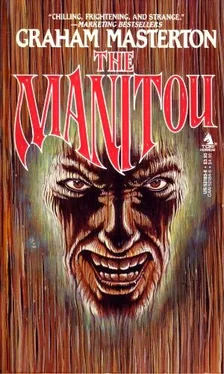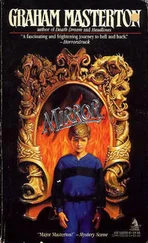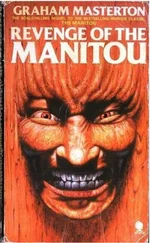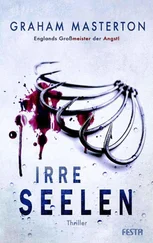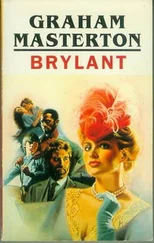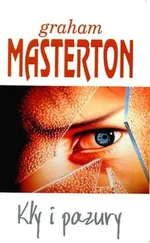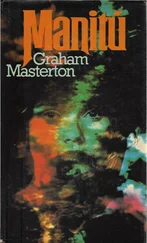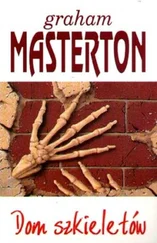Dr. Hughes rubbed his eyes, and then looked at me narrowly. "All right — supposing someone is sending a signal to Karen Tandy, with the intention of making her ill. Who is it, and why are they doing it?"
"Your guess is as good as mine. But don't you think it might do some good if we talk to Karen herself?"
Dr. Hughes spread his hands. "She's in pretty bad shape. Her parents are flying in this evening, in case we can't pull her around. But I guess it wouldn't affect her chances if we tried."
He lifted the phone and spoke to his secretary. In a few minutes, she bleeped back and said she'd made arrangements for us to visit Karen.
"I'm afraid you'll have to wear a surgical mask, Mr. Erskine," said Dr. Hughes. "She's quite weak, and we don't want any more infections getting into her system."
"That's okay by me."
We went down to the tenth floor, and Dr. Hughes showed me into a dressing room. As we tied on green surgical robes and masks, he explained that he would have to ask me to leave if her condition worsened even slightly.
"I'm only letting you see her because you have a theory, Mr. Erskine, and anybody with a theory could help us. But I warn you that this is all very unofficial, and I don't want to have to explain to anyone why you're here."
"I get you," I said, and followed him down the corridor to Karen Tandy's room.
It was a big corner room, with a view of the snowy night on two sides. The walls were pale hospital green, and there were no flowers or decorations, except for a small picture of a fall day in New Hampshire. Karen Tandy's bed was surrounded with surgical equipment, and there was a clear drip feed going into her right arm. She had her eyes closed, and she looked as white and wan as the pillow she was lying on. There were dark umber circles around her eyes, and I could hardly recognize her as the girl who had come into my apartment the previous night.
But it was the tumor that was the most startling. It had swollen and grown around her neck, pale and fat and threaded with veins. It must have been twice the size it was the night before, and it was almost touching her shoulders at the back. I looked across at Dr. Hughes and he simply shook his head.
I pulled up a chair to her bedside and laid my hand on her arm. She felt very cold. She stirred a little, and her eyes opened slightly.
"Karen?" I said softly. "It's me — Harry Erskine."
"Hello," she whispered. "Hello, Harry Erskine."
I leaned closer. "Karen," I said. "I've found the ship. I went to the library and looked it up and it was there."
Her eyes flickered toward me.
"You've — found it?"
"It's a Dutch ship, Karen. It was built around 1650."
"Dutch?" she said weakly. "I don't know what it could be."
"Are you sure, Karen? Are you sure you haven't ever come across it before?"
She tried to shake her head, but the distended tumor prevented her. It bulged from the back of her neck like an awful pallid fruit.
Dr. Hughes laid his hand on my shoulder. "I don't think we're getting very far, Mr. Erskine. Maybe we just ought to leave it."
I grasped Karen's wrist more firmly.
"Karen," I said. "What about de boot ? What about de boot, mijnheer? "
"The — what?" she whispered.
"De boot, Karen, de boot."
She closed her eyes, and I thought she'd gone back to sleep again, but then something seemed to shift and stir on the bed. The bulging white tumor sudden wriggled, as though there was something alive inside it.
"Oh, Christ," said Dr. Hughes. "Mr. Erskine, you'd better —"
"Aaaahhh," groaned Karen. "Aaaahhhhh."
Her fingers clutched the sheets, and she tried to toss her head. The tumor squirmed and wriggled some more, as if it was clutching the back of her head, and squeezing it.
"AAAAAAAAAAAAAAHHHHHH!" she screamed. "DE BOOOTTTTTT!!"
Her eyes rolled toward me, and for one strange moment they looked like the eyes of someone else altogether — bloodshot and fierce and remote. But then Dr. Hughes was ringing the bell for the nurses, and fixing a syringe of sedative, and I was ushered away from the bedside and into the corridor. I stood there, hearing her scream and fight inside, and I felt as helpless and isolated as I'd ever been in my whole life.
CHAPTER THREE
Through the Shadows
A few minutes later, Dr. Hughes came out of Karen Tandy's room, stripping off his gloves and his mask with weary resignation. I went up to him immediately.
"I'm sorry," I told him. "I just didn't realize it would have that effect."
He rubbed his chin. "It's not your fault. Neither did I. I've given her a light sedative and it should help her to calm down."
We walked back to the changing-room together and took off our surgical robes.
"What worries me, Mr. Erskine," said Dr. Hughes, "is that she responded so violently to those words you came out with. Up until then, she was okay — or at least as well as anybody could be expected to be with that kind of a tumor. But it seemed like you triggered something off there."
"You're right," I agreed. "But exactly what was it? Why should a normal intelligent girl like Karen Tandy get so upset by the idea of an old Dutch galleon?"
Dr. Hughes opened the door for me and led me out to the elevator.
"Don't ask me," he said. "You're supposed to be the mysticism specialist."
He pressed the button for eighteen.
"What did the X-rays show you?" I asked. "The ones you took in the operating theater?"
"Nothing very clear," answered Dr. Hughes. "When I said there seemed to be a fetus in that tumor, I should have said it was something fetus- like, but not exactly a baby in the accepted sense of the term. There is a growth of bone and flesh, which seems to have a systematic pattern of development, the same way that a baby has, but whether it's human or not, I can't say. I've called in a gynecological specialist, but he can't make it here until tomorrow."
"But supposing tomorrow's too late? She looks — well, she looks as though she's going to die. "
Dr. Hughes blinked in the bright light of the elevator. "Yes, she does. I just wish to hell there was something I could do about it."
The elevator reached the eighteenth floor and we stepped out. Dr. Hughes led me into his office and went straight over to his filing cabinet and brought out a bottle of whiskey. He sloshed out two large glassfuls, and we sat down and drank in silence.
After a while, he said: "You know something, Mr. Erskine. It's ridiculous and it's insane, but I believe that this nightmare has something to do with this tumor."
"In what way?"
"Well, the two seem closely inter-related. I guess you spiritualists would think that the nightmare was causing the tumor, but I'd say it was the other way around — that the tumor is causing the nightmare. But whichever it is, it seems to me that if we can discover more about the nightmare we can discover more about the condition."
I swallowed a burning mouthful of neat Scotch. "I've done all I can, Dr. Hughes. I located the ship, and the ship seems to provoke a pretty severe reaction. But where can we go from here? I've told you — I'm only a quack when it comes to the real occult. I don't see what else I can do."
Dr. Hughes looked thoughtful. "Supposing you do what I'm doing, Mr. Erskine. Supposing you seek expert assistance."
"What do you mean?"
"Well, surely all clairvoyants aren't — quacks, like you. Some of them must have genuine talent for investigating things like this."
I put down my glass. "Dr. Hughes, you're really serious, aren't you? You really believe there's something occult going on here."
Dr. Hughes shook his head. "I didn't say that, Mr. Erskine. All I'm doing is exploring every possibility. I learned a long time ago that, in medicine, it can be fatal to leave any avenue unexplored. You can't be narrow-minded, not when a human being's life is at risk."
Читать дальше
